Thursday, May 7th 2020

AMD B550 Chipset Detailed, It's Ready for Zen 3, Older AM4 Motherboards not Compatible
In their briefing leading up to today's Ryzen 3 3100 and 3300X review embargo, AMD disclosed that its upcoming "Zen 3" 4th generation Ryzen desktop processors will only support AMD 500-series (or later) chipsets. The next-gen processors will not work with older 400-series or 300-series chipsets. This comes as a blow to those who bought premium X470 motherboards hoping for latest CPU compatibility running into 2020. At this time only B550 is available, but we expect more news on enthusiast chipsets as the Zen 3 launch date comes closer. AMD B550 is a fascinating new mid-range chipset by AMD. Launching today as a successor to the popular B450 chipset, B550 is a low-power silicon with roughly the same 5-7 W TDP as the older 400-series chipset. Although AMD won't confirm it, it's likely that the chipset is sourced from ASMedia. It brings a lot to the table that could draw buyers away from B450, but it also takes some away.
The AMD B550 currently only supports 3rd generation Ryzen "Matisse" processors. Ryzen 3000 "Picasso" APU are not supported. What's more, older Ryzen 2000 "Pinnacle Ridge," "Raven Ridge," and first gen Ryzen 1000 "Summit Ridge" aren't supported, either. The Athlon 200 and 3000 "Zen" based chips miss out, too. AMD argues that it ran into ROM size limitations when trying to cram AGESA microcode for all the older processors. We find that hard to believe because B450 motherboards with the latest ComboAM4 AGESA support 2nd gen and 3rd gen processors, including APUs and Athlon SKUs based on the two. On the bright side, AMD assured us (within its marketing slides for the B550), that the chipset will support upcoming processors based on the "Zen 3" microarchitecture. The company also came up with a new motherboard packaging label that clarifies that the processors won't work with the 3400G and 3200G.AMD B550 motherboards will feature partial PCI-Express gen 4.0 support. The main PCI-Express x16 slot, and one of the M.2 NVMe slots that are wired to the "Matisse" processor will be PCI-Express gen 4.0, however, all downstream PCIe lanes put out by the B550 chipset are gen 3.0. This is still a step up from 400-series "Promontory" chipsets, which are limited to gen 2.0. B550 puts out eight PCIe gen 3.0 lanes, which combine with the 20 usable processor lanes from "Matisse" to take the platform's total PCIe budget to 28 lanes (x16 gen 4.0 + x4 gen 4.0 + x8 gen 3.0). The B550 chipset itself connects to the "Matisse" processor via a PCI-Express 3.0 x4 connection.
In terms of connectivity, AMD's B550 chipset puts out up to six SATA 6 Gbps ports with AHCI and RAID capability; two each of 10 Gbps USB 3.2 gen 2 and 5 Gbps USB 3.2 gen 1 ports; and six USB 2.0 ports. PCIe, SATA, and USB connectivity from the "Matisse" processor is unchanged: four 10 Gbps USB 3.2 gen 2 ports, and up to two SATA 6 Gbps ports.The processor includes a PCI-Express 4.0 x16 PEG connection that can be split between slots. AMD is allowing motherboard designers to have multi-GPU capability with the B550, where the x16 PEG link is split between two x16 slots (electrical x8). Previously this capability was limited to the top-tier X370 and X470 boards. The processor also puts out one PCI-Express 4.0 x4 link meant to drive one M.2 NVMe slot or U.2 NVMe port. Every B550 motherboard we've seen so far features one M.2 PCIe gen 4.0 x4 (64 Gbps) slot.As with both its predecessors, the B350 and B450, the new B550 chipset enables full multiplier-based CPU overclocking, along with broad memory overclocking support. Motherboard designers are at liberty to kit out the B550 with the most elaborate CPU VRM solutions. Expect some of the pricier B550 boards to match their X570 counterparts in overclocking capability.
Motherboards based on the AMD B550 chipset are expected to launch on June 16, 2020. Prices start at $100, according to AMD.
The AMD B550 currently only supports 3rd generation Ryzen "Matisse" processors. Ryzen 3000 "Picasso" APU are not supported. What's more, older Ryzen 2000 "Pinnacle Ridge," "Raven Ridge," and first gen Ryzen 1000 "Summit Ridge" aren't supported, either. The Athlon 200 and 3000 "Zen" based chips miss out, too. AMD argues that it ran into ROM size limitations when trying to cram AGESA microcode for all the older processors. We find that hard to believe because B450 motherboards with the latest ComboAM4 AGESA support 2nd gen and 3rd gen processors, including APUs and Athlon SKUs based on the two. On the bright side, AMD assured us (within its marketing slides for the B550), that the chipset will support upcoming processors based on the "Zen 3" microarchitecture. The company also came up with a new motherboard packaging label that clarifies that the processors won't work with the 3400G and 3200G.AMD B550 motherboards will feature partial PCI-Express gen 4.0 support. The main PCI-Express x16 slot, and one of the M.2 NVMe slots that are wired to the "Matisse" processor will be PCI-Express gen 4.0, however, all downstream PCIe lanes put out by the B550 chipset are gen 3.0. This is still a step up from 400-series "Promontory" chipsets, which are limited to gen 2.0. B550 puts out eight PCIe gen 3.0 lanes, which combine with the 20 usable processor lanes from "Matisse" to take the platform's total PCIe budget to 28 lanes (x16 gen 4.0 + x4 gen 4.0 + x8 gen 3.0). The B550 chipset itself connects to the "Matisse" processor via a PCI-Express 3.0 x4 connection.
In terms of connectivity, AMD's B550 chipset puts out up to six SATA 6 Gbps ports with AHCI and RAID capability; two each of 10 Gbps USB 3.2 gen 2 and 5 Gbps USB 3.2 gen 1 ports; and six USB 2.0 ports. PCIe, SATA, and USB connectivity from the "Matisse" processor is unchanged: four 10 Gbps USB 3.2 gen 2 ports, and up to two SATA 6 Gbps ports.The processor includes a PCI-Express 4.0 x16 PEG connection that can be split between slots. AMD is allowing motherboard designers to have multi-GPU capability with the B550, where the x16 PEG link is split between two x16 slots (electrical x8). Previously this capability was limited to the top-tier X370 and X470 boards. The processor also puts out one PCI-Express 4.0 x4 link meant to drive one M.2 NVMe slot or U.2 NVMe port. Every B550 motherboard we've seen so far features one M.2 PCIe gen 4.0 x4 (64 Gbps) slot.As with both its predecessors, the B350 and B450, the new B550 chipset enables full multiplier-based CPU overclocking, along with broad memory overclocking support. Motherboard designers are at liberty to kit out the B550 with the most elaborate CPU VRM solutions. Expect some of the pricier B550 boards to match their X570 counterparts in overclocking capability.
Motherboards based on the AMD B550 chipset are expected to launch on June 16, 2020. Prices start at $100, according to AMD.
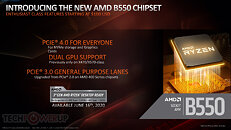
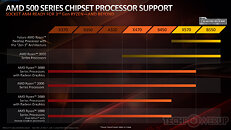
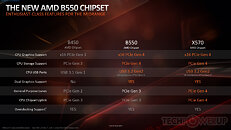
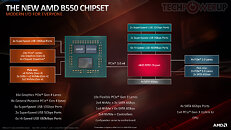
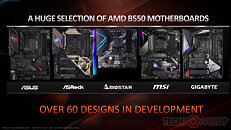
434 Comments on AMD B550 Chipset Detailed, It's Ready for Zen 3, Older AM4 Motherboards not Compatible
If you delete your comment, I'll delete mine just so that the moderators don't need to get involved and we all stay happy.
But yeah, it would be troublesome to clean that up.I'd say makers would ultimately pass the cost of a bigger ROM chip to the consumers, but they still have to make the money transfer first...
I don't get the whole preference thing, we're nothing to these corporations, yet we treat them as they're our best friend that either just brought us a keg of cold beer, or just cheated with our girlfriend on us...
Just out of curiosity, because I'm honestly curious when people have a configuration like yours, and I absolutely mean no offense, but how is it possible that you could afford a $750 CPU, but then not have $200 for an X570 motherboard (there's X570 boards down to $160)?
They never specified that future CPUs would work with all boards. This is what you read into that message.
Sure, I agree, they made it sound like you would be able to run a 4th gen Ryzen CPU in an X370 board, but considering the mess with the 3rd gen Ryzen, I didn't have high hopes.
I guess you didn't buy that system after X570 and Ryzen 3000 was announced?
Since you don't have any system specs listed, I have no comments to add with regards to your current machine, beyond, did you update to the latest UEFI?
I mean, I myself would sell the old board to help pay for new board but not everyone can. I know cpu is expensive but possible all savings went to it. All around different situations.
Seriously you made an account to comment on b550, it's not even the pre eminent board for Ryzen and despite 22 years in the game it took b550 to Make your mind up that you want Intel to slap your ass more.
Cool story bro , pass me your contact list I'll sort them out:p :D ,you been confused about shit for a while since this whole time you were in doubt while intel had those extra 5-10fps already.
Even the doubt you show about how close the performance is between these platforms screams of noob , read up, none of this shits new especially in Intel's case they been selling the same shit plus plus100mhz for year's.
With Z490, there's mainly a promise of potentially getting PCIe 4.0 in the future, on some slots, if you upgrade your CPU. The rest isn't really new, apart from the socket that is and the four lanes of PCIe from the CPU for an NVMe drive.
I like drooling over pictures of motherboards too :toast:
But yeah, only was of mobo manufactures making money is by selling new ones, new bios cost them money...
because X570 super expensive and I have waited 1 year for B550 until I finally gave up and got a B450 and paired with a 3700x. While B550 is nothing more than a X470 with limited PCIe 4.0 support, now I'm locked from upgrading to 4000 series when it comes out.
It's a dickmove, just like disabling PCIe 4.0 on older boards was.
AMD can't afford dickmoves...they just recently got on top. that's not the way to stay there